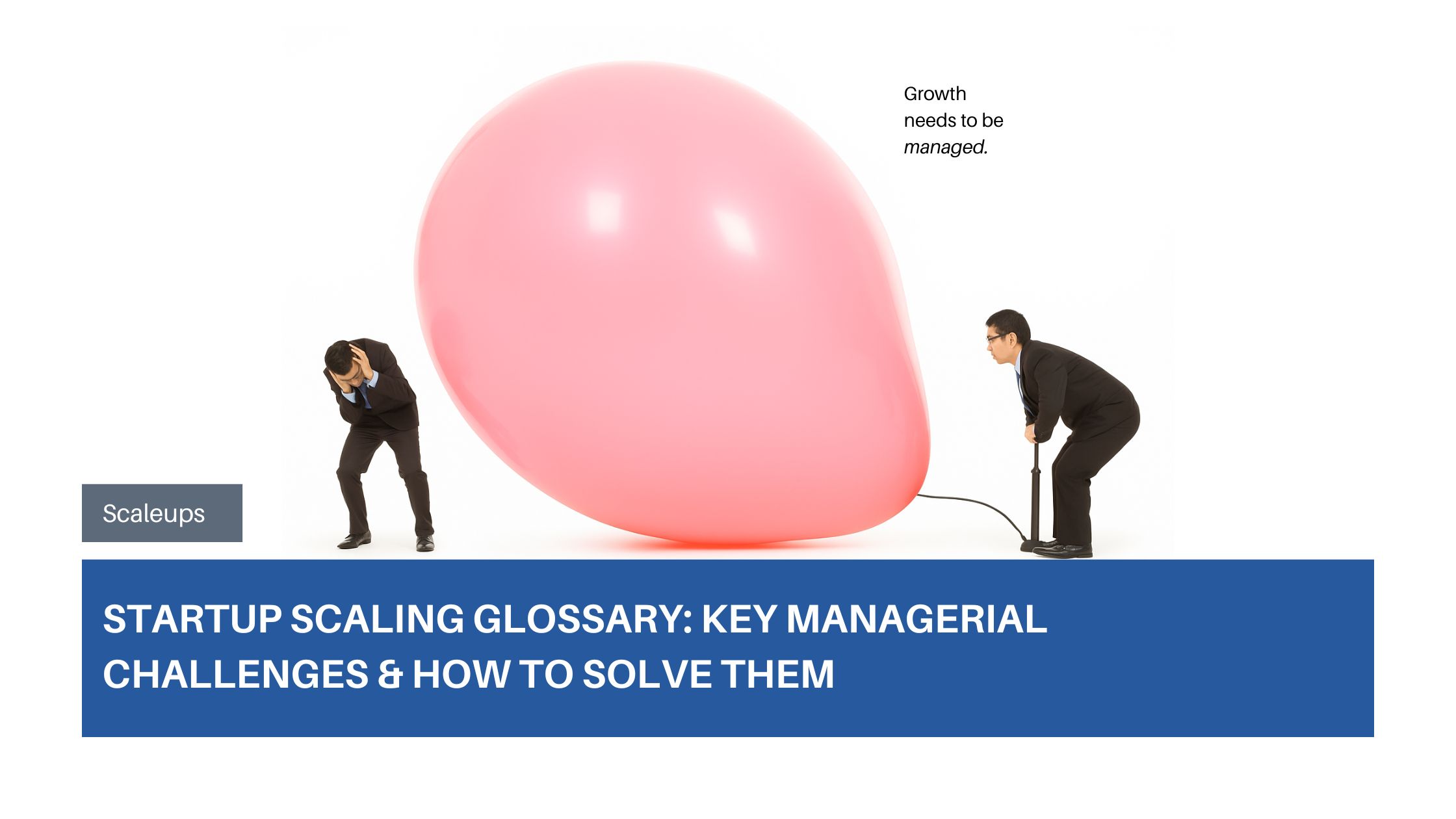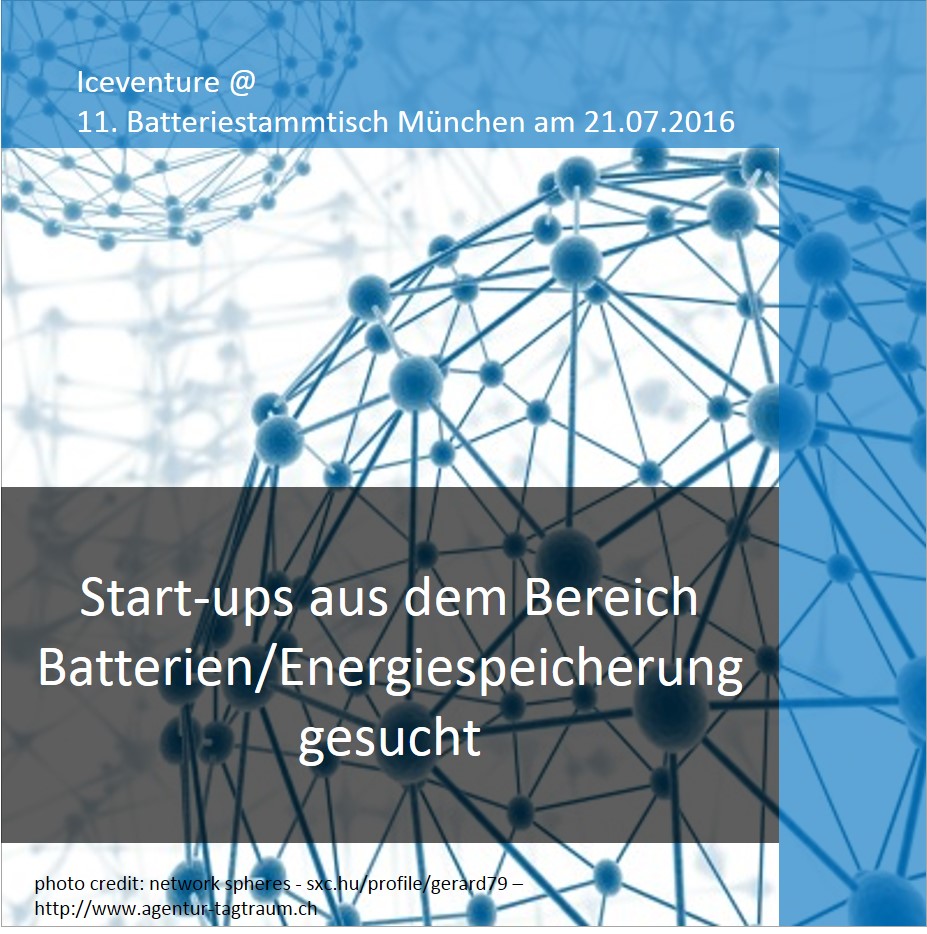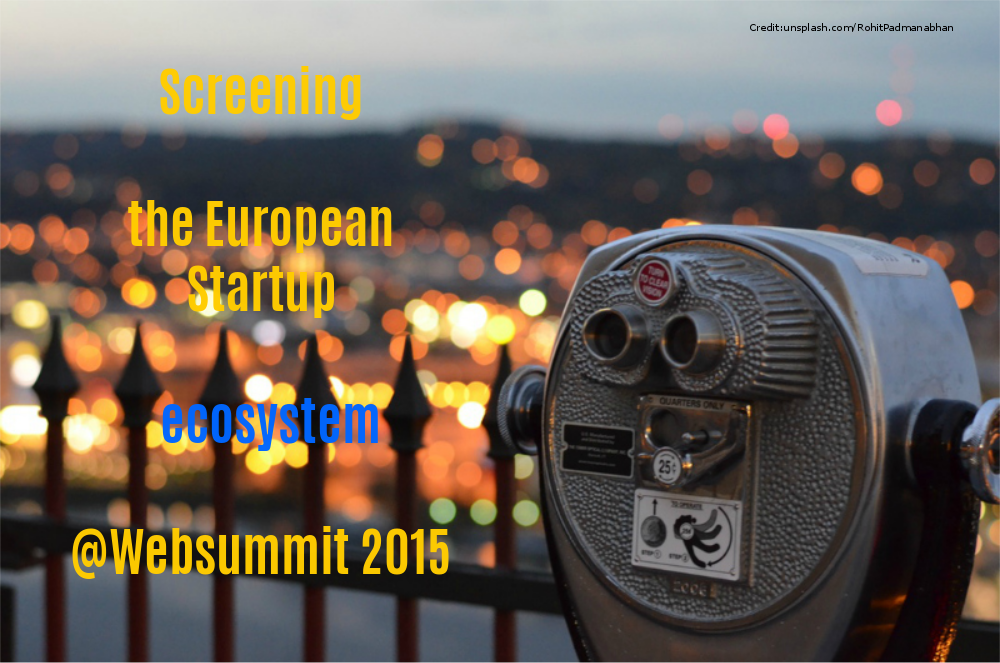Anzeige der Artikel nach Schlagwörtern: startup
Startup Scaling Glossary: Key Managerial Challenges & How to Solve Them

Scaling a startup is like raising a baby: exciting, rewarding, but then things could go sideways if you're not careful. It comes with a unique set of managerial challenges that can make or break success. According to the ESI Scaleup Monitor 2025, only 0.47% of European firms are categorized as scale-ups (younger companies achieving consistent hypergrowth of over 40% annually) highlighting just how challenging and demanding sustainable hypergrowth is.
Once you’ve nailed product–market fit, the next challenge kicks in: scaling rapidly, being prepared for it, and managing growth without losing focus or control. Most don’t succeed. What worked with a team of 10 starts to crumble at 30. Then again at 100. The Startup Genome Report shows that 74% of high-growth startups fail: not because of a bad idea, but because they scaled too early or managed it poorly.
Whether you're chasing Series B or building a sustainable B2B engine, scaling exposes hidden weaknesses: in leadership, revenue models, cost structures, internal systems, and organizational design. And often, you're discovering those cracks while moving at full speed.
This glossary highlights the most common growth pains companies face during scaling—one letter at a time—and offers practical steps founders and managers can take to navigate them and build for sustainable growth.
5 Main Challenges of Scaling Your Business and How to overcome them
5 Main Challenges of Scaling Your Business and How to Overcome Them

Many startups aspire to scale, but scaling successfully is far from guaranteed. For those aiming to grow rapidly and capture market share, scaling brings opportunities — and significant challenges. Only 1 in 10 companies in Europe grow by more than 10% annually over three years. Even when growth happens, it brings new hurdles that test founders, teams, and systems.
While startups often focus on product-market fit and early traction, scaling requires a different mindset and structure. It impacts every aspect of a business — from leadership to processes, culture, and cash flow. Without the right strategies, rapid growth can overwhelm even the most promising company.
In this article, we outline five major challenges that founders face when scaling a business and share practical, proven actions to overcome them.
Scaling in Europe: Top Success Stories and Lessons You Can Apply in 2025

Scaling a business from startup to scaleup is notably challenging, especially in the fragmented and diverse European market. Entrepreneurs often face hurdles such as market fragmentation, lack of regulatory harmonisation, funding limitations, and cultural and institutional challenges. Nonetheless, a notable number of European startups and SMEs have managed to not only survive but thrive, providing crucial insights into their paths of rapid growth.
In this article, we explore successful scaleup cases as highlighted by the European Scaleup Monitor 2023 and compare them with the most recent insights from the 2024 edition. We also integrate several insights from our own experiences and practice.
Is there a replicable formula for scaling success? What elements are essential to the elusive 'scaling DNA'? And how do specific market demands shape the scaling process?
Our goal is to uncover common patterns among these high-growth European firms, offering practical insights for managers and decision-makers to tackle their own growth challenges and seize new opportunities.
VCs/investors in European SaaS startups An Overview 082018
We updated our overview of investors in European SaaS companies.
The good news is - also for this update we find an increasing numbers of Europe based SaaS only VCs as well as US veterans investing in Europe.
In addition, many funds invest at least parts of their portfolio in Software as a Service in Europe.
This does not make it easier to start and scale a SaaS business to €100 M in Europe, but at least it is a starting point.
Ideen und Start-ups im Bereich chemische Energiespeicher/Batterien gesucht! Edition 2016
Die Energiewende, Grid Storage und die Emobilität sind in aller Munde und schreiten mit großen Schritten voran. Daher sind innovative Ideen und Start-ups in dem Bereich "chemischer Energiespeicher/Batterien" unerlässlich. Aber: Neue Techniken müssen entsprechend entwickelt und danach publiziert und vermarktet werden. Doch das ist oft schwer!
 Der Münchner Batteriestammtisch möchte in seiner elften Ausgabe am 21.07.2016 jungen Talenten/Firmen und frischen Ideen Raum geben. Deshalb bietet er die Möglichkeit, sich zu präsentieren.
Der Münchner Batteriestammtisch möchte in seiner elften Ausgabe am 21.07.2016 jungen Talenten/Firmen und frischen Ideen Raum geben. Deshalb bietet er die Möglichkeit, sich zu präsentieren.
Bei dieser Veranstaltung, bei der Arnbjörn Eggerz von Icevenutre Mitinitiator ist, können junge Firmen ausstellen und sich so präsentieren.
Die Unkostenbeteiligung ist 50€. Bei Sponsorenbeteiligung wird dieser Betrag nicht erhoben.
Wir möchten gerne Ideen und Vorschläge hören, die sich mit dieser Thematik befassen. Uns würde interessieren:
VCs/investors in European SaaS startups An Overview 052016
I have been asked the questions many times in the last years: SaaS in Europe in principal a good idea, but who invests in them?
The good news is, there has been quite a change as we find an increasing numbers of Europe based SaaS only VCs as well as US veterans investing in Europe. In addition, many funds invest at least parts of their portfolio in Software as a Service in Europe.
This does not make it easier to start and scale a SaaS business to €100 M in Europe, but at least it is a starting point.
If you know an investor that is missing, drop as a line or a comment. I plan to update the list in intervals.
No liabilities for accuracy or completeness
Check our other resources on SaaS in the links below
If you want to know more about all KPIs and sides of the SaaS business model check out Iceventure's SaaS online training or read our articels on saas here on the blog. Get your idea or company off the ground: 1h Start-up Online Consulting
Start-up Ökosysteme in Europa aus Sicht der Forschung - Interview mit Prof. Christian Lechner
Start-up Ökosysteme sind auch in der Wahrnehmung der breiten Öffentlichkeit angekommen. Dies ist ein wichtiger Schritt auf dem Weg der Entwicklung und ein wichtiger Moment für die Innovationskultur und Ökosystementwicklung in Deutschland/Europa, die ich bei Iceventure (und vorher in anderer Funktion) bereits seit über 10 Jahren begleite.
Doch für die weitere qualitative Entwicklung sind einige Punkte von Bedeutung, die neben den allgemeinen Themen wie z.B. Verfügbarkeit von VC oft nicht bekannt sind und diskutierte werden, da sie nur aus der längeren Perspektive wie z.B. in der Unternehmensberatung mit Historie in systemischen Projekten wahrgenommen werden.
Also ein guter Anlass diese in einem Interview mit Prof. Christian Lechner, Experte für Gründungsmanagement und Start-up Ökosysteme zu thematisieren. Dias auch um den nüchternen Blick der Forschung, geschärft durch konsolidiertes Wissen, für die vielen Diskussionen z.B. mit Kunden, die gerne etwas für das regionale Ökosystem tun möchten, aufzubereiten.
the Web Summit scam debate - Thoughts on how to choose startup-events and why we go there
Right after publishing the blog post that I will participate in this year's Web Summit 2015 in Dublin I got a couple of requests by our startup clients. They in particular asked two questions:
• Why I break the rule, I preach all the time not to attend startup events?
• When breaking the rule why then by going to Web Summit, the event accused of being a scam?
The disclaimer:
Before continuing this article, I have to give a full disclaimer: I have been invited by the Web Summit team to do media coverage, especially on Fintech covered in the Money Summit.
There is no other affiliation nor have I been asked to publish an article about the allegations.
I have never been to Web Summit before, although I know the conference since its beginning, so I cannot give you a first-hand insight about participation in the past.
Still I deem it important to write about the subject matter as it is discussed also in Germany and it is a perfect occasion to illustrate some insights that are valuable for our readers, startups and (not yet) clients in general.
Valuing information quickly - the scam critique on Web Summit
The first insight is about how to evalue the fraud allegations on a general level as such situations repeat over time.
There is so much information – and (emotional) opinion snippets (aka Shitstorm) in the web that the first thing you need is a quick technique with which you can assess information in a very short time (the business case for structured feeds).
A simple, but effective way I found over time – albeit not being perfect - is to check the volume of reaction e.g. in form of comments. The danger is to overvalue emotional reactions leading to many comments (or good social media teams commenting) as they can be very far removed from reality, but it is one indicator.
With 55 and 12 comments on the relevant articles on Tech.eu you get the impression that the problem cannot be as huge compared to about 20000 participants in 2014
A second indicator is that most people preferred to remain anonymous. In this case, it is strange because it should not be a problem to tell your story when others did so openly. What do you have to lose as a start-up when you speak out against an event? They might not invite you or sell you a ticket in the future - so what? They are not your customers, nor your investors. And once you are in the unicorn club, they will invite you in any case. If not invited then, it is still a great media story, so why care.
Then there was another sentence in one article that caught my attention:
Iceventure ist auf dem Web Summit 2015 - Startup Interview/Präsentations Gelegenheit
Arnbjörn Eggerz, Geschäftsführer von Iceventure wird dieses Jahr am Web Summit in Dublin teilnehmen.
Update: Ein Beitrag über die Gründe und die Vor- und Nachteile für Gründer folgt, währenddessen dieser Beitrag meinen Fokus für dieses Events behandelt: Was möchte mit Teilnehmer diskutieren und was sind die Erkenntnisse für unserer Kunden, die ich als Teil unserer Business Intelligence sammeln werde.
Über den Web Summit und unsere Teilnahme
 Web Summit ist ein ziemlich großer Event mit ungefähr 30.000 Teilnehmern und 1000 Sprechern. Diese Größenordnung wurde innerhalb 5 Jahren erreicht. Allein die pure Zahl der Teilnehmer macht die Veranstaltung zu einem interessanten Ort, um die Stimmung und den Zustand der Europäischen Start-up und Innovationsökosystem für unsere Kunden einfangen. Dies als Nebeneffekt einer Einladung des Web Summit Teams zur Berichterstattung über den Money Summit, die innerhalb der ganzen Konferenz das Thema Fintech behandelt. Vielen Dank an das Web Summit Team für diese Gelegenheit!
Web Summit ist ein ziemlich großer Event mit ungefähr 30.000 Teilnehmern und 1000 Sprechern. Diese Größenordnung wurde innerhalb 5 Jahren erreicht. Allein die pure Zahl der Teilnehmer macht die Veranstaltung zu einem interessanten Ort, um die Stimmung und den Zustand der Europäischen Start-up und Innovationsökosystem für unsere Kunden einfangen. Dies als Nebeneffekt einer Einladung des Web Summit Teams zur Berichterstattung über den Money Summit, die innerhalb der ganzen Konferenz das Thema Fintech behandelt. Vielen Dank an das Web Summit Team für diese Gelegenheit!
Nachdem es bis zu 21 Mini Gipfel gibt habe ich entscheiden den Fokus auf diese drei für unsere Kunden wichtige Themen zu legen:
Fintech
Fintech ist ein Sektor, der immer mehr und mehr Aufmerksamkeit erlangt. Bei all dem Enthusiasmus die Bankenlandschaft zu ändern, halten wir es jedoch für notwendig die Dinge in der richtigen Perspektive zu betrachten.
Eine Perspektive ist die Betrachtung von Fintech-Innovation mit laufenden Branchenentwicklung in der immer noch andauernden Bankenkrise, zu kombinieren, wie es in dem Post über „Tradeshift" oder in der Analyse von Plan B aus Fintechsicht „Valuation of Plan B laid out by Mr. Varoufakis" erläutert wird.
Die zweite wichtige Perspektive ist die Fintech Innovation gegenüber einer möglichen Implosion der Banken als Folge der der Euro-Krise und den Folgen von Deleveraging für den gesamten Sektor.
Drittens, die Rückführung dieser Innovationen in den Rahmen solider Makro Theorie in dem z.B. klar wird, dass Bitcoins ein super Zahlungsmittel sind, aber keine besondere und bessere Währung mit allen daraus folgenden Konsequenzen aus dieser Analytik.
Iceventure goes Web Summit 2015 – start-ups interview/presentation opportunity
Arnbjörn Eggerz, managing director of Iceventure, will participate in this year's Web Summit.
There will be a follow-up post on the why and pros and cons, while this post is about my focus for this event: What is it, I like to discuss with participants and what are the insights for our clients I will collect as part of our business intelligence activity.
 About the Web Summit and our participation
About the Web Summit and our participation
Web Summit is a rather large event with about 30.000 participants and over 1000 speakers. It grew to this dimension in about 5 years.
The sheer number of participants makes it a very interesting place to catch the sentiment of the European start-up and innovation for our clients, with the side fact of an invitation by Web Summit to do media coverage on the Money Summit. So thanks a lot to the Web Summit team for inviting me!
There are up to 21 Mini Summits -all of course interesting - out of which I decide to focus on these:
Fintech
Fintech is a sector that got more and more attention. With all the enthusiasm, we deem it however necessary to put things in a perspective. With persepctive I mean to change focus from an individual tech solution to an overall sector outlook in the current context of banking.
One perspective is the combination of Fintech innovation with ongoing sector trends in the banking crisis as explained in the Tradeshift post or the valuation of Plan B laid out by Mr. Varoufaksi.
A second important perspective is Fintech innovation versus the implosion of banking due to e.g. the Euro crisis.





